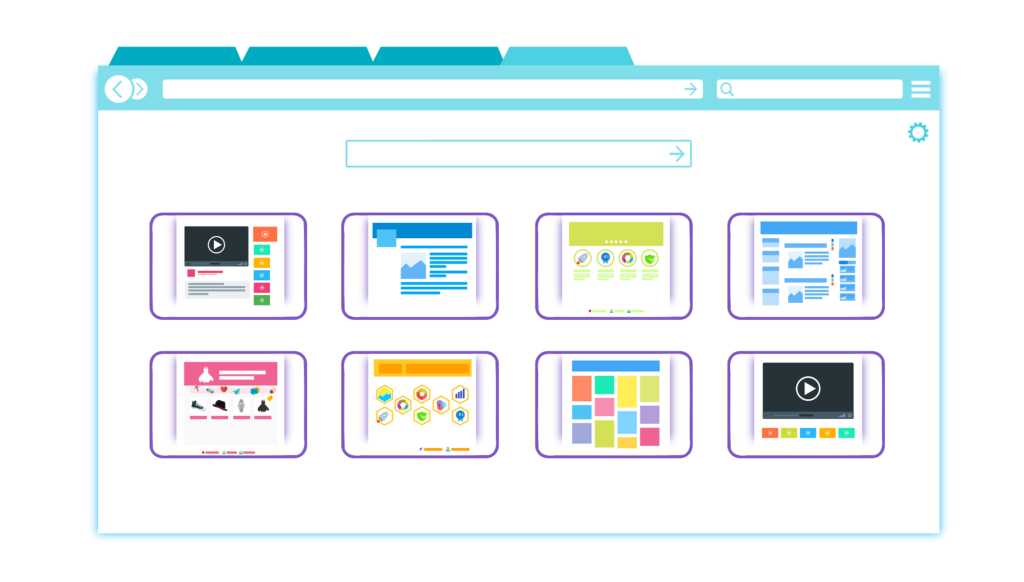In today’s digital age, the importance of having a website for your small or medium-sized business cannot be overstated. Whether you’re a dentist, chiropractor, physiotherapist, salon owner, pet groomer, or tattoo artist, a website is an essential tool that can significantly enhance your business operations and success. This blog post delves into the four primary functions a website can serve for your business: Marketing, Sales, Support, and System Management. By understanding these functions, you’ll see why investing in a professional website is one of the best decisions you can make for your business.
Marketing: Elevating Your Business Visibility
1. Enhancing Visibility with Organic SEO
Search Engine Optimization (SEO) is the process of optimizing your website to rank higher in search engine results. When potential customers search for services you offer, a well-optimized website will appear prominently in the results, increasing the likelihood of attracting new clients. Organic SEO involves using relevant keywords, creating quality content, and obtaining backlinks from reputable sources. By investing in SEO, your website becomes a powerful marketing tool that continually attracts new customers without ongoing advertising costs.
2. Leveraging Google Ads
While organic SEO is crucial, combining it with paid advertising through Google Ads can maximize your visibility. Google Ads allows you to target specific demographics, locations, and even times of day to ensure your advertisements reach the right audience. By driving traffic to your website through targeted ads, you can generate leads and convert them into paying customers more efficiently.
3. Utilizing Social Media
Social media platforms like Facebook, Instagram, and Twitter are excellent channels for promoting your business. By linking your website to your social media profiles, you create a cohesive online presence that encourages potential customers to learn more about your services. Social media allows you to engage with your audience, share updates, and drive traffic to your website, further enhancing your marketing efforts.
4. Offline Marketing Strategies
Don’t underestimate the power of offline marketing. Including your website address on business cards, pamphlets, and billboards bridges the gap between traditional and digital marketing. This approach ensures that anyone who encounters your business offline can easily find more information and engage with your services online.
Sales: Converting Visitors into Customers
1. Providing Contact Information
A well-designed website makes it easy for potential customers to contact you. Displaying your phone number, email address, and a contact form ensures visitors can reach out with ease. Additionally, incorporating an appointment booking system allows customers to schedule services directly from your website, streamlining the process and increasing conversions.
2. Showcasing Value
Your website serves as a platform to highlight the unique value your business offers. Detailed service descriptions, customer testimonials, and case studies provide evidence of your expertise and the benefits of choosing your business. This content builds trust and encourages visitors to take the next step toward becoming paying customers.
3. Collecting Customer Data
Collecting customer information through your website is invaluable for nurturing leads and maintaining customer relationships. By offering newsletters, special offers, or educational content in exchange for email addresses, you can build a database of potential and current customers. Regularly engaging with this audience through email marketing keeps your business top-of-mind and encourages repeat business.
4. Engaging with Educational Content
Providing educational content on your website, such as blog posts, videos, and infographics, positions your business as an authority in your field. This content not only attracts visitors but also demonstrates your knowledge and commitment to helping your customers. By regularly updating your website with valuable information, you can keep your audience engaged and encourage them to choose your services.
Support: Enhancing Customer Experience
1. Providing Instant Information
One of the primary advantages of a website is the ability to provide instant information to potential and current customers. Detailed FAQs, service descriptions, and contact information eliminate the need for customers to call or visit your business for basic inquiries. This convenience enhances the customer experience and reduces the workload on your staff.
2. Offering Self-Service Options
A website can include self-service options such as online appointment booking, order tracking, and account management. These features empower customers to take control of their interactions with your business, leading to increased satisfaction and loyalty. Self-service options also free up your staff to focus on more complex customer needs.
3. Providing Consistent Support
Your website is available 24/7, providing consistent support to your customers regardless of your business hours. This availability ensures that customers can find the information they need and engage with your services at their convenience. Consistent support builds trust and enhances your business’s reputation.
4. Enhancing Communication
Incorporating live chat or chatbot functionality on your website can provide immediate assistance to visitors. These tools answer common questions, guide users through your website, and even help with troubleshooting issues. Enhanced communication through your website ensures that customers feel supported and valued, improving their overall experience.
System Management: Streamlining Business Operations
1. Centralizing Appointments
A website with an integrated appointment booking system simplifies scheduling for both customers and staff. Customers can book services at their convenience, and staff can easily manage and track appointments. This centralization reduces the likelihood of double-booking and ensures a smooth flow of business operations.
2. Automating Customer Data Management
Collecting and storing customer data through your website automates a significant portion of your administrative tasks. Information such as contact details, service preferences, and appointment history can be accessed and managed in one place. This automation reduces manual data entry, minimizes errors, and frees up time for other critical tasks.
3. Streamlining Communication
Automated email confirmations, reminders, and follow-ups enhance communication with your customers. These automated messages keep customers informed and engaged, reducing no-shows and improving overall customer satisfaction. Streamlined communication through your website ensures that customers receive timely and accurate information.
4. Integrating Business Tools
A website can integrate with various business tools such as CRM systems, payment gateways, and marketing platforms. These integrations streamline your operations by connecting different aspects of your business, from lead generation to payment processing. By leveraging these tools, you can create a cohesive and efficient system that supports your business’s growth.
In conclusion, a website is an indispensable asset for any small or medium-sized business. It serves as a powerful marketing tool, converting visitors into customers, enhancing customer support, and streamlining business operations. By investing in a professional website, you not only increase your business’s visibility and credibility but also create a seamless experience for your customers.
In this digital era, understanding how a website can benefit your business is crucial. If you’re ready to take the next step and elevate your business with a professional website, we’re here to help. Contact us at info@appmakerszone.com to learn more about how we can create a website that meets your business’s unique needs and sets you apart from the competition.
We have created a short video that explores the four primary functions a website can serve for your business: Marketing, Sales, Support, and System Management. By understanding these functions, you’ll see why investing in a professional website is one of the best decisions you can make for your business.
Outline:
00:00:00 Your Key to Unlocking Growth
00:00:53 Finding Your Customers Online
00:01:40 The Power of Website Sales
00:02:20 Your Website as a Support Superhero
00:02:56 Websites Powering Your Business Operations
00:03:33 Take Your Business to the Next Level with a Website
Check out the video to discover how a website can transform your business!





